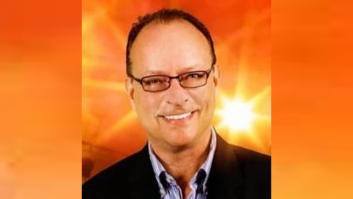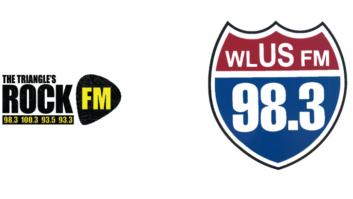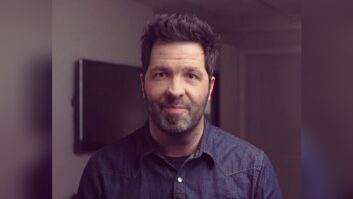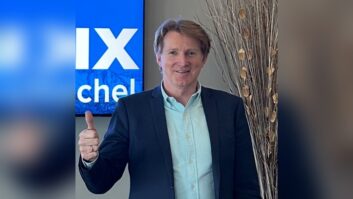After a career spanning almost 50 years of music-making, music recording/mixing and audio test and measurement, Tom Mintner has retired from full-time work life.
At the end of 2016, he sold his company NTI Americas to his business partners, although he plans to keep some of his connections with the audio world.
Over the years, he also worked for the University of Iowa, Credence Systems, Studer/Revox, Rupert Neve and Audio Precision.

Mintner looked back over the past half-century with Radio World and shared recollections.
His interest in music and electronics began at a young age. “Early on, we moved to pre-Disney Orlando, Fla., and there was always a technical vibe in the family. My father was an engineer involved in the rocketry and aerospace business, both the military aspects and tangentially with Cape Canaveral.
“Occasionally, I ran into guys at live performances who showed up with 300 pounds of Ampex tape decks and a pair of [Neumann] U 67s, hauling them around in their station wagons. Right away, I became interested in this technology, and then in other aspects, including broadcasting and cinema sound.”
Mintner’s formal education in electronics began in high school. “Public schools at the time had never heard of a technology curriculum, but with some prodding from parents, they established an independent studies course held in a closet. In that closet were a Dumont oscilloscope, Heathkit oscillator and HP 410 VTVM,” a Hewlett-Packard vacuum-tube volt meter.
“That was all it took, I was officially hooked on electronics.”
MUSIC TECH
Mintner continued his education at Northwestern University in Evanston, Ill., where he majored in music and started taking technical courses. He noted, though, there was a pronounced divide between the two disciplines.
“Unlike university curricula today, there was nothing like a music technology program. In fact, there was actually hostility from the music faculty concerning technology. This was true in most music schools at the time. Many musicians and musical academics thought that technology, and in particular electronic music, was threatening to put musicians completely out of work.”
Mintner recalls that this attitude slowly began to change.
“About halfway through my stay at Northwestern, the administration grudgingly put up a tiny budget and assigned a new theory and composition professor to electronic music, and so a friend and I helped him to build what was the first electronic music studio facility at Northwestern. That motivated me to take some independent studies in physics, which were focused on musical acoustics. Then, inspired by reading about people like Bob Moog and Don Buchla, I started building ring modulators and the occasional mixer for local jazz musicians, as well as trying to build synthesizer circuits.”
Mintner recalls working for Thomas Willis as an assistant in his classes at Northwestern. Willis was the senior arts and music critic for the Chicago Tribune.
“His NU gig was just to teach a class or two. But he always took the time and had the heart to be a creative and powerful mentor for myself and many other students over the years.”
His first job after graduation was at the University of Iowa as a Performer/Fellow at the Center for New Performing Arts and recording studio there.
“In addition to supporting new music technology and one of the world’s first laser image projection systems, we recorded and edited for various record labels,” he said. “There were some ambitious broadcast projects as well, including a TV and FM simulcast broadcast and recording of Mahler’s ‘Symphony of a Thousand,’ produced together with the Iowa Public Broadcasting Network (now IPTV).”
A few years later, he packed up for New York and a job at Rupert Neve. This turned out to be an education of a different sort. Working as the tech support point man for the new NECAM console automation system involved a lot of travel, as well as interfacing with engineers and their often grumpy producers.
“The upside was I got to see and work with the very top studios in the U.S. and elsewhere. And ultimately, I learned a lot from those grumpy but supremely gifted producers and top engineers,” he said.
“At Studer, I got a practical education about great audio manufacturing technology, and perhaps just as important, about the global nature of the audio and video industry, then and now. Also working in Manhattan and up and down the Northeast corridor, I had the opportunity to serve some of the great network owned and operated AM-FM-TV operations at what might have been their peak in the late ’70s through ’80s. Since Studer was based in Zurich, I also discovered how a multi-national company worked.”
Moving to Audio Precision in Oregon and becoming part of the ownership there, he became part of what he calls “a truly great American high-tech engineering company.”
Engineering at AP, he said, was driven primarily by several of the founders, but overall product planning and development was by consensus from a kind of development council, consisting of key employees. Mintner also guided the company’s U.S. sales and marketing, as well as producing advertising and other materials.
“During my 13th year at Audio Precision, we sold AP to a venture capital company, and by 2001 I had moved on to Credence Systems, an automated test equipment IC test company,” where he managed low-frequency test products.
Around this time, so-called convergence trends in IC and product technology meant that system-on-chip IC testing had to test not only digital logic but audio, video, IF, RF and other functional blocks. “Since I had already taken AP sales into areas such as multimedia PC audio testing, the jump over to learning full IC testers in a short amount of time was possible, if a bit challenging,” Mintner recalled.
TECHNICAL LIFESTYLE
He soon moved to NTi Audio.
“I knew my future European partners at NTi from my time back at AP. By 2003 they had already completed a spin-off of NTi from Neutrik and were exploring the problem of support and distribution for North and South America.”
They joined forces to form NTI Americas Inc. in Oregon as an independent partner to the main company in Liechtenstein. (The North American company writes NTI with a capital “i” while the international entity does not.)
“From the beginning, we offered complete service, technical, calibration and of course sales support.” Technical services in test and measurement must meet strict performance standards; and in an addition to his general management role at NTI Americas, Mintner was responsible for maintaining some of the higher-level service and adjustment/calibration work.
NTi makes handheld instruments as used by acousticians, system installers, broadcast and studio engineers, development engineers and educators. It also makes larger analyzers and software systems used for engineering design and factory production of audio and acoustic devices; and it is known for “defect detection” systems for transducers, such as loudspeakers and microphones.
“All the larger test systems are individually selected or engineered for each customer’s application, for example to test a mobile device, cellphone or perhaps a communications channel on an airplane or an automated evacuation system protecting a nuclear plant or defense facility,” he said.
Mintner has witnessed a split in the electronics industry between the design function and that of production engineering test. Much of the factory production for consumer and pro gear is done in Asia, while engineering development test can be almost anywhere. “So with the large testers, NTi’s organization must often be coordinating among three continents to get the jobs done, usually working both with client company staff in multiple locations as well as outside consultants.”
On the handheld instrument side, the biggest changes in recent years, he said, have been greatly increased measurement quality and a proliferation of feature-rich small devices, along with a post-9/11 emphasis on intelligibility testing for emergency systems and security applications.
In broadcast, the change in engineers’ instruments and their use of them have been driven as much by shifts in broadcast ownership and employment patterns of engineers and technicians themselves as anything, Mintner said.
“Years ago, at a larger station we might stop by and have a leisurely demo and chat with multiple separate transmitter, studio engineering and other technical staff at each station. Today, with IT expertise added and even dominating the work, many fewer staff are usually spread around several locations in order to support their specialty for a group cluster of stations — or in many cases even now as independent contractors rather than direct station employees.”
This type of technical lifestyle, he said, demands even more lightweight and task-efficient portable gear.
“The traditional generator-analyzer test sets weighing 20 to 30 pounds are a thing of the past, and of course analog and various forms of digital testing must all be accommodated. The measurement data must also be easily available to the PC if desired, for reports and other analysis, but without necessarily lugging round a connected laptop during the actual measurement work.”
TECHNICAL WIZARDS
As he departs NTi Audio, is there anything that Mintner will miss?
“Everything,” he told Radio World. “All the great customers, partners, engineers and technical wizards from many disciplines with whom I have had the privilege to learn from and work with.
“I have been privileged to have worked for and known some of the best in both music and technology. On the tech side that includes Willy Studer, Eugene Spoerri, Rudy Van Gelder and Phil Ramone. In music, my original teachers Jerry Stowell of the Chicago Symphony Orchestra and Robert Willaman. Also, composers like David Tudor, William Hibbard and Peter Todd Lewis, not to mention the hundreds of other conductors, composers and fellow musicians and engineers over the years on both sides of the studio glass and proscenium.”
For Mintner, retiring does not mean relocating.
“I’ve been in Oregon since 1989, so now I am a completely converted Oregonian and westerner. My family loves Oregon and the Pacific Northwest, so we’ll stay right here. We’ve got beaches with mountain streams right on them cascading out to the ocean, mountain ranges, famous wineries as well as Portland, with one of the best ‘foodie’ scenes in the country, along with the best classical music station left in the U.S., KQAC. Where would I go?”
The future does not mean the end of work for Mintner. “While I’m retiring from NTi and full-time work, I’m not quite retiring overall. Another small company of mine is called Audio Support Northwest, and it is where I can do system test design and audio consulting work that might come up.”
Comment on this or any story. Email[email protected]with “Letter to the Editor” in the subject field.







